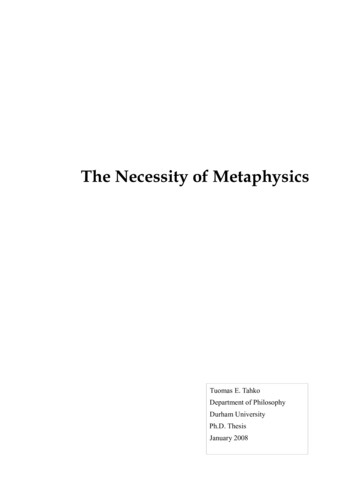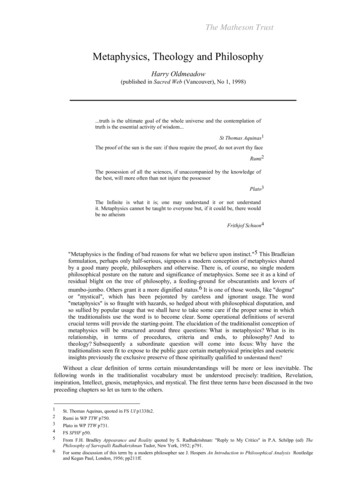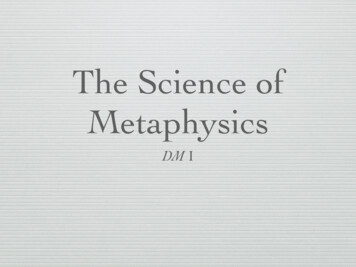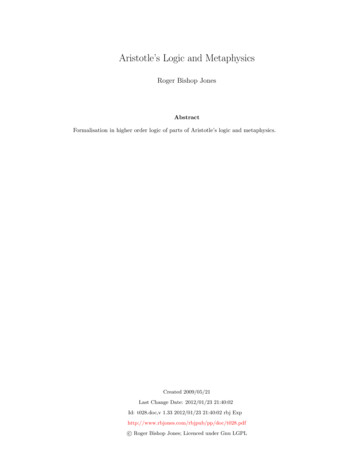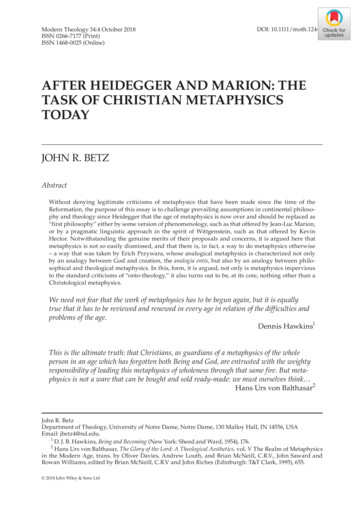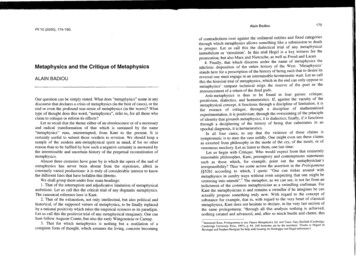
Transcription
Alain Badiou175PJi10 (2000),174-190.Metaphysics and the Critique of MetaphysicsALAIN BADIOUOur question can be simply stated. What does "metaphysics" name in anydiscourse that declares a crisis of metaphysics (in the best of cases), or theend or even the profound non-sense of metaphysics (in the worst)? Whattype of thought does this word, "metaphysics", refer to, for all those whoclaim to critique or reform its effects?Let us recall that the theme either of an obsolescence or of a necessaryand radical transformation of that which is sustained by the name"metaphysics" runs, uninterrupted, from Kant to the present. It iscertainly useful to submit these verdicts to revision. We should keep asample of the modern anti-metaphysical spirit in mind, if for no otherreason than to be baffled by how such a negative certainty is answered bythe interminable and uncertain history of the perpetual reconstitution ofmetaphysics.Almost three centuries have gone by in which the opera of the end ofmetaphysics has never been absent from the repertoire, albeit inextremely varied productions: it is truly of considerable interest to knowthe different fates that have befallen this libretto.We shall group them under four main headings:1. That of the interruption and adjudicative limitation of metaphysicalambitions. Let us call this the critical trial of any dogmatic metaphysics.The canonical reference here is Kant.2. That of the exhaustion, not only intellectual, but also political andhistorical, of the supposed virtues of metaphysics, to be finally replacedby a rational positivity which takes the empirical sciences as its paradigm.Let us call this the positivist trial of any metaphysical imaginary. One canhere follow Auguste Comte, but also the early Wittgenstein or Camap.3. That for which metaphysics is nothing but a mutilation of acomplete form of thought, which assumes the living, concrete becomingof contradictions over against the unilateral entities and fixed categoriesthrough which metaphysics allows something like a submission to deathto prosper. Let us call this the dialectical trial of any metaphysicalimmobilism or 'eternitism'. In this trial Hegel is a key witness for theprosecution, but also Marx and Nietzsche, as well as Freud and Lacan.4. Finally, that which discerns under the name of metaphysics thenihilistic disposition of the entire history of the West. 'Metaphysics'stands here for a prescription of the history of being such that to desire itsreversal one must engage in an interminable hermeneutic wait. Let us callthis the historial trial of metaphysics, which in the end can only oppose tometaphysics' rampant technical reign the reserve of the poet or theannouncement of a return of the dead gods.Anti-metaphysics is thus to be found in four guises: critique,positivism, dialectics, and hermeneutics. If, against the vacuity of themetaphysical concept, it functions through a discipline of limitation, it isthe essence of critique; through a discipline of mathematizedexperimentation, it is positivism; through the overcoming of the principleof identity that grounds metaphysics, it is dialectics; finally, if it functionsthrough a deciphering of the history of being that culminates in anepochal diagnosis, it is hermeneutics.In all four cases, to say that the violence of these claims issymptomatic is to state the case mildly. One might even see these claimsas extorted from philosophy in the mode of the cry, of the insult, or ofvenomous mockery. Let us listen to them, one last time:Let us begin with Critique. Who would expect from that eminentlyreasonable philosopher, Kant, peremptory and contemptuous statementssuch as those which, for example, point out the metaphysician'sirresponsibility? Thus we come across the assertion in the Prolegomena[§52b] according to which, I quote: "One can tinker around withmetaphysics in sundry ways without even suspecting that one might beventuring into untruth".1 The metaphor, as we can see, is not far from anindictment of the common metaphysician as a swindling craftsman. ForKant the metaphysician is and remains a swindler if he imagines he canactually propose something truly new. With regard to the concept ofsubstance for example, that is, with regard to the very heart of classicalmetaphysics, Kant does not hesitate to declare, in the very last section ofthe same prolegomena: "through all this analysis nothing is achieved,nothing created and advanced, and, after so much bustle and clatter, thisI Immanuel Kant. Prolegomena to any Future Metaphysics, Ed. and Trans. Gary Hatfield (Cambridge:Cambridge University Press, 1997), p. 94. [All footnotes are by the translator. Thanks to Miguel deBeistegui and Stephen Houlgate for help with locating the Heidegger and Hegel I, Ill,1!r!'Ii!11
176science is still where it was in Aristotle's time".2 We can ask ourselves ifKant does not in fact, with his rather laboured, emphatic style, add to thisvery bustle and noise even though, with a self-assurance which shouldalso elicit commentary, he nonetheless does claim to be putting a stop,once and for all, to the bustle in question. In any case this is theinjunction which opens the Prolegomena, which should be quoted in full,for so much pride is a rare thing indeed: "My intention is to convince allof those who find it worthwhile to occupy themselves with metaphysicsthat it is unavoidably necessary to suspend their work for the present, toconsider all that has happened until now as if it had not happened, andbefore all else to ask the question: 'whether such a thing as metaphysicsis even possible at all",.3As we can see, the introduction to a critical metaphysics, which is anexposition of the transcendental as such, is undertaken according to ananti-dogmatic line of violence whose very necessity should be put intoquestion.The positivists are no less acrimonious, even when, like AugusteComte, they hold metaphysics to be a temporarily useful but alreadyobsolete state of thought. Whilst Kant is enamoured of the image ofmetaphysics as an interminable and fruitless battle, as a conceptualstruggle over so much wind, Auguste Comte introduces the image ofmetaphysics as mental illness. Thus in the Discours sur l'Esprit Positif,he declares that "ultimately, one can view the metaphysical state as a sortof chronic illness which naturally inheres in our mental evolution, bothindividual and collective".4 This propensity to pathologise metaphysicsand to prescribe a brutal therapy to deal with its most acute cases hasbeen hugely popular, to the present day. One can no longer count thephysicians crowding the bedside of the man either sick with metaphysics,or sick from the sickness of metaphysics itself.It's true that for Comte (but is it so different for Kant? And will it beso different for Wittgenstein, or Heidegger?) the metaphysical state is notsimply a mental disposition. It is also that which an entire intellectualgroup lays claim to, a group whose social power is not to beunderestimated. Indeed, if the critique of metaphysics can so quickly turnviolent, it is because political determinations are always at stake. ForComte there exists a metaphysical party, which he has all the reasons tofear, as he clearly expresses in that astonishing text which is the 'Personal2 Ibid.,p.122.Ibid., p.5.4 Auguste Comle, Discours sur ['Esprit Positifin Traite Philosophique d'Astronomie Populaire (Paris:Fayard. 1985), p. 22.JAlain BadiouPIi 10 (2000)177Preface' to the Cours de Philosophie Positive. There he writes,comparing the dangers he faces from the clerical party to those he faces atthe hands of the metaphysicians: "Towards the metaphysical party,whether governing or aspiring to, my necessary position, albeit relative toa less pronounced collision, is, at base, even more dangerous for me."sAnd he gives his reason, which in my opinion has lost none of itsrelevance: "More enlightened and more supple, this equivocal party [.]is just as interested as the purely theological pretenders in preventing, byany means necessary, the social installation of the true modernphilosophy.,,6Here we are. One of the common meanings of the term "metaphysics"designates, beyond the discursive apparatuses of the reigning philosophy,a fearsome force, whose area of influence is much vaster than theUniversity, a conservative force that blocks a strategic passage: thepassage between philosophy and social order. A force that, as Comteargues, attempts to hinder, by any means necessary, the "socialinstallation" of anti-metaphysical philosophy, whether this philosophy becritical, positive, dialectical, or hermeneutic.Somewhat blurring the outline of this essay, allow me to remark that itis just such a force that in a very different (one might even say opposite)register Heidegger diagnoses under the name of metaphysics. Whether itis a question of the unrelenting and sterile irresponsibility, indicated byKant, or of the equivocal and devastating pathological force, named byComte, Heidegger is more prone to raising the stakes than to any form ofrestraint. It is only at this price, after all, that he can include Nietzschehimself, and ultimately Nietzsche above all, within metaphysics. ForNietzsche is indeed the philosopher who has given the prevalence of ametaphysical disposition with regard to being the name it ultimatelydeserves: the will to power. Against this Heidegger shows himself to beno less violent in his words than his predecessors. In the fourth book ofhis Nietzsche, Heidegger does not hesitate to call "machination" thehegemony of Being under the sway of the metaphysical structure. And headds: "When meaninglessness comes to power by dint of machination,the suppression of meaning and thus of all inquiry into the truth of Beingmust be replaced by machination's erection of "goals" (values).,,7\ Auguste Comte, Preface Personelle in Physique Sociale. eours de Phi/osophie Positive, Ler;om 46aMI (Paris: Hermann, 1975), pAn."Ihid.I Martin Heidegger, Nietzsche. Zweiter Band IGesamtausgabe Band 6.21 (Frankfurt Am Main: VittorioKlostcrmann, 1997), p.14. English Translation from Martin Heidegger, Nietzsche. Volume Ill: The Will(" !'ower as Knowledge and Metaphysics (New York: Harper & Row, 1987), p.175.
178Alain BadiouPli 10 (2000)To the conspiracy of the metaphysical party, denounced by Comte,corresponds the ontological machination, which founds the criminal reignof the meaningless.Of course for Comte the conspiracy of the metaphysical party wentonly as far as his exclusion from the Ecole Polytechnique, whilst forHeidegger metaphysics, unbridled as machination, as technical nihilism'spower of enframing, signals nothing less than the devastation of theEarth. On the one hand, a civil servant failing to attain his professorship,on the other, the planetary reign of technology, with a little of what I'dlike to call ontological ecology. It is, as it were, a Franco-Germandifference. This difference should not stop us from noticing that with acentury between them, and in opposed conceptual contexts, the sameproject is pursued: the identification, under the name of "metaphysics", ofa corrosive power obsessed with maintaining its domination over ahistory that is both deep and diverted; obsessed with hindering, by anymeans necessary, that which is to come and save us, whether this comingbe, for the German, predictably, a refashioning of the Greek gods, or, forthe Frenchman, and predictably as well, the arrival of a professor ofphysics in the great schools, doubling as the founder of a subversivepolitical faction.At a more immediately philosophical level, the determination of theessence of metaphysics as power or as party, always refers, as is attestedboth by Comte and Heidegger, to the fact that metaphysics leavesundetermined the true nature of what is. This is a crucial point in allcritical acceptations of the word "metaphysics": what is to be feared in itis precisely the apparent weakness of its content. For it is indeed in thevague or undecided character of metaphysical determinations that itsusage and deployment as a force is to be located.What makes metaphysics fearsome is that it ignores the discipline ofthe true questions in favour of an indeterminacy that any signifier ofmastery whatsoever can come to inhabit. What is to be feared inmetaphysics is, under the mask of a search for truth, a cold and arguellindifference to the very question of truth. This is stated with particularclarity by Heidegger himself in the notes entitled Towards the history 01'being as metaphysics: "All the events of the history of Being, which ismetaphysics, have their beginning and their ground in this, thillmetaphysics leaves and must necessarily leave undecided the essence 01Being, insofar as an appraisal of what is question-worthy, that is, of whatis problematic, aimed at safeguarding its essence, is from the beginnill)'. II179matter of indifference to metaphysics, and this in the indifference of non knowledge."sKant had already recognised this indifference in his observationregarding the sterile combat and conceptual immobility which afflictedmetaphysics after Aristotle. He had recognised that speculative dialecticsconstantly feeds off of its own inability to attain knowledge. He hadspotted what Heidegger calls "the indifference of non-knowledge".Nevertheless, he had undoubtedly not recognised that far from being adecisive objection, the acknowledgement of metaphysics' indifference isalso the acknowledgement of the origins of its power. "Metaphysics"means: the reign of the essentially undetermined. It is in the interests ofmetaphysics, insofar as it is the history of thought as power, that theessence of Being remain undecided. But this is what Comte had alreadymade out, when he emphasised, as one of the indispensablecharacteristics of metaphysical entities, what he called their "vagueness",or their "equivocity". And when he wrote, again in his Discours, that the"historical efficacy of these entities is a direct result of their equivocalcharacter",9 he linked, like Heidegger, the theme of a historical or destinalpower of metaphysics to the abstract indifferentiation of its problems. ForHeidegger, metaphysics conceals the question of Being under that of thesupreme being, and proceeds to forget this forgetful configuration itself towelcome, under the name of overman, the technical absoluteness ofnihilist man. In this sense metaphysics is a simplified and abstractreligion, concerned with undecided entities. But Comte had alreadyforged in his own language what would become the thesis of an onto theological unity of metaphysics: "Metaphysics" - he writes - "is in factlIothing but a form of theology gradually enervated by dissolvingsi mplifications" .10I ndifference, simplification, abstraction, separation, dissolution: such;11(' Ihe operations through which, under the accepted name of1I11·taphysics, the power of a neutral thought, or of the object-less·1I1'lIl11cnt, establishes itself. The power of the undecided and the11lHktcnnined as such. 111,".,' "ole, can be found appended to the second volume of Heidegger's Nietzsche in the'. ""/"",,.\. "'I{' edition. Martin Heidegger, Nietzsche. Zweiter Band (Gesamtausgabe Band 6.2 ]iI ''''' h", Alii Main: Vittorio Klostermann, 1997), pA18. This passage is not to be found in Krell'sI,.",· 1""0,, :I"d runs as follows in the original: "Alle Ereignisse in der Geschichte des Seins, dieH. "'loIl\"" i'.I, haben ihren Beginn und Grund darin, daB die Metaphysik das Wesen des Seins'1111111,.11111-.1"11 UHI und lassen muf3, sofern ihr eine Wi.irdigung des Fragwilrdigen zugunsten der1!,1I111lj' 11111"'. ·i}'.('flcll"1.Id IWesens van Beginn an gleichgi.iltig bleibt, und zwar in der GliechgGltigkeit des"1111"11'. "\"11111t. Hl'" I 1". / ;s('(mrs sur /'Esprit Positif, p. 21.
180Alain BadiouPH 10 (2000)It is after all in full agreement with this portrait of metaphysics thatcontemporary positivists, the partisans of linguistic empiricism, declarethat what gives metaphysics its power is the very thing that obliges us torid ourselves of it, that is, its lack of sense. One must here followWittgenstein's sinuous trajectory in the Tractatus from aphorism 6.40 to6.50. Metaphysics is identified here, just as in Carnap, to statementsdevoid of sense. Aphorism 6.53 specifies that "one must say nothingexcept what can be said, i.e., the propositions of science". And he adds:"whenever someone else wanted to say something metaphysical, [.]demonstrate to him that he had failed to give meaning to certain signs inhis propositions."] IOnce again, metaphysics means: undetermined, devoid of anyassignable signification. For Wittgenstein, metaphysics denotes the voidin signification, just like for Heidegger it denotes the void in theproblematic or the question, and for Comte the void in scientificdenotation. For all that, Comte is quite close to the beginning of theTractatus when he declares that he considers it "a fundamental law, thatany proposition that is not strictly reducible to the simple statement of afact, whether particular or general, cannot exhibit any real or intelligiblesense."Certainly. But in human experience there are not only thinkable facts,even for Comte, who will one day be obliged, before the markedlysingular fact that is his desire for Clotilde de Vaux, to pronounce what hecalled "the characteristic verdict": "One cannot always think, but one canalways love". Even here something of metaphysics' power to support theundetermined is made apparent. And even for Wittgenstein, there isn'tjust what can be said, there are also, Tractatus 6.522: "things that cannotbe put into words. They make themselves manifest. They are what ismystical.,,12 But what then is to distinguish the mystically unsayable fromthe metaphysically undetermined? Already in Comte, what is todistinguish the social religion which seals the alliance of the Woman andthe Proletarian from the vague and equivocal entities of metaphysics? Inthe gap between the mystical element and metaphysical non-sense; in thegap between the positivist sciences and the positivist religion, the entireproblem of metaphysics as power interjects itself, as the capacity to investwith the supra-sensible the entire territory of the unsayable, to over determine the undetermined. Even in Heidegger's case - though, as hesays in his testamentary declaration, only a God can save us - the question1112Ludwig Wittgenstein, Tracratus Logico·Philosophicus (London: Routledge, 1974). p.74.Ibid., p. 73.!181of knowing what this "God" is, and in what sense it is not, at the verypeak of nihilist distress, the last recourse to the metaphysicallyundetermined, poses itself with a certain intensity.Basically, for critique as for hermeneutics and positivism, metaphysicsis identified with the dogmatic assumption of the undetermined, as a falseknowledge of the essence, and it is precisely here that its power is thoughtto lie. But to ward it off, one must have recourse to a higherindeterminacy, or more accurately: one must affirm that the undeterminedremains undetermined, the unknowable unknowable, where metaphysicsin its cunning rationality inserts the undetermined into the discursiverationality of a determination.We shall therefore hold that critique, positivism, and hermeneutics,even if we were to grant that they diagnose metaphysics correctly, merelyreplace it with what we shall call an archi-metaphysics, that is, with thesuspension of sense to an undetermined that is purely and simply left tothe historial indeterminacy of its coming. Archi-metaphysics is thereplacement of a necessary undetermined with a contingent one, or: theestablished power of an unknown master is opposed by the poetics orprophetics of the to-come. This is the case with the mystical element inWittgenstein, as with the metaphorical God in Heidegger or the positivistchurch in Comte.This is above all what must originally be perceived in Kant'sreplacement of knowledge with faith. God as regulative idea, God aspostulated by practical reason, the God of religion within the limits ofreason alone, much more essentially undetermined and unknowable thanthe God proved by Descartes or Leibniz, is in this sense moremetaphysical than either Descartes' or Leibniz's God. The fact that itgrounds its own indeterminacy is only an apparent progress. For whereReason draws its limit, common morality at once brings its unformedGod, whether it be called Man, or the indistinct something which is towarn us against malevolence.Archi-metaphysics, in its positivist, critical or hermeneutic guises,always resolves itself into an indistinct promise, the ethical converse ofthe order that it claims to overcome. Philosophy of the day in differentoutfits, archi-metaphysics ineluctably activates all of the possibledecompositions of the concept.One is thus obliged to recognise, with Hegel, the native superiority ofdogmatic metaphysics over critical archi-metaphysics. This superiority isbased on the postulates of rationality which in rational metaphysics bluntindeterminacy and expose transcendence to a rational control morerigorous than could ever be exerted by positivism's Humanity, Kant's
182moral subject, or the poet of hermeneutics. Dogmatic metaphysicsdefends the rights of indeterminacy only within the bounds of apreliminary thesis which affirms that thought and the thinkable arehomogenous to each other. As Hegel writes in the introduction to theScience of Logic: "Ancient metaphysics had in this respect a higherconception of thinking than is current today. [.] This metaphysicsbelieved that thinking (and its determinations) is not anything alien to theobject, but rather is its essential nature, [.] and that thinking in itsimmanent determinations and the true nature of things form one and thesame content.,,13Therefore we could say that ancient metaphysics accepted the place ofthe undetermined in the Parmenidean maxim, the maxim that declares theidentity of being and thought. This is why it authorises us to proceed,with regard to the concept of metaphysics itself, in a dogmatic rather thancritical fashion.A being, philosophically accessible as a name, can be said to beessentially undetermined if amongst the predicates that permit itsdefinition is the claim that this being exceeds, in its very essence, anypredicative determination available to an understanding such as ours.Often, though not without fail, the understanding which functions as acriterion will be defined as finite, whilst the essential excess of the beingin question with regard to any determination whatsoever will be called itsinfinity.The name of "metaphysics" will then be given to that discursivedisposition which claims that an undetermined being, as we have justdefined it, that is, a being whose determination exceeds our cognitivepower, is required in order to complete the edifice of rational knowledge.This undetermined being is classically given the name of God, butmetaphysics lasts well beyond this name. It is enough, for metaphysics toretain its power, that it be able to place, within a discursive frameworkavailable to all - an argumentative and not a revealed framework, in otherwords a rational framework - a point of indeterminacy that may, fromthat moment on, harbour any signifier of mastery whatsoever.It will be noted that this definition of metaphysics is compatible withthe one usually attributed to Aristotle, who regards the science of beingqua being, whose existence as a science is acknowledged in BookGamma of the Metaphysics, as immediately introducing indeterminacy,or what August Comte would have called the equivocal. For being is saidin many ways. But the science of being qua being also introduces theIJAlain BadiouPH 10 (2000)G.W.F. Hegel, Science of Logic, lrans. A.V. Miller (New York: Humanity Books, 1999), p.4S.l11I183determinate framework of this indeterminacy. For being is said "1tpO EV", towards the One. This is the subtle balancing act of metaphysics,which must determine in terms of the One what it otherwiseundetermines, what it sets out as the overcoming of determination itself.For metaphysics is, and this is its shortest definition, that which makesa predicate of the impredicable.In this regard one must go further back than Aristotle, to Plato, andspecifically to the Book 6 of the Republic, when Socrates simultaneouslyformulates the demand for the Good conceived of as radicaltranscendence together with its absolute conceptual indeterminacy. Whatis a determination for Plato? A form, an Idea, an intelligible section ofbeing. And what is the Good? That which is not an idea, that which, asSocrates says, surpasses any idea by far both in power and prestige.In other words, the existence of the Good is necessary, but itscomplete determination is impossible. That one may prove an existencewithout thereby determining what exists is the core of metaphysics aspower.Metaphysics is classical, or dogmatic, when it grants the undeterminedpoint of its apparatus the rationality of its existence.This point is crucial. What classical metaphysics after Plato borrowsfrom mathematics is the demonstration of existence purely on the basis ofthe concept. Metaphysics is at base the recognition of a pure existence.Meaning that this existence, which cannot be empirically attested, and thebeing of whose content is beyond the measure of our cognition, cannonetheless be rationally demonstrated.The power of classical metaphysics is mathematical, in the sense thatit originates from the demonstration of the existence of an existentwithout it being the case that 'what exists' is commensurable to itsdetermination. This is the case, for example, when we demonstrate a non denumerable infinity of transcendental numbers, whilst it is quite difficultto exhibit any of them, or when we affirm that there exists an infinitefamily of non-principal ultra-filters, when in this case it is impossible toconstruct even one of them.It is therefore true, as Kant had already noted, that the proofs of theexistence of God form the hard core of classical metaphysics, just as theyhas already served to complete both the Physics and the Metaphysics ofAristotle. Much noise is made every time that a refutation, ordialectisation, of these proofs is able to eradicate that which is inquestion, that is, the affirmed existence of an essential undeterminedbeing. In truth, subtracting this existent from the regime of proof serves
184Alain BadiouPIi 10 (2000)only to make us pass from classical metaphysics to modern archi metaphysics. For the function of proof is not to prove. Rather, its functionis to analogically assure the mathematicity of existence, and therefore toassure the rational compatibility of the undetermined with the proposedregime of determination. By giving a proof of the existence of theundetermined, or of the infinite; or more precisely, by acknowledgingwithin the discourse itself that the existence of the essential undeterminedbeing is a matter of proof, you show, regardless of whether this proof isuniversally convincing or not, that in any case you hold that existence isrationally shared between the undetermined and the determined, theinfinite and the finite.Descartes adds the finishing touches to this stance when he declaresthat the will, or freedom. that is to say, pure and bare existence, is neitherdistinguishable nor hierarchisable between man and God.Classical metaphysics owes its greatness to this transit from the finiteto the infinite by way of existence. This is what I call the mathematizedregime of existence, the one to which Spinoza entrusts the entirearchitecture of his thought.In the end, nothing is more corrosive for philosophy than to separateitself from this regime, which creates, beyond that which can beempirically attested, the real of a simple possibility, and destines thoughtto the only thing that matters, its absolute identity with the being that itthinks.This is to say that critique, in Kanfs sense, misses what is essential todogmatic metaphysics, the mode of subsumption of the existential by therational for which mathematics serves as the paradigm. This wasrecognised by Plato, and later Descartes, Spinoza, and Leibniz. And it isto this that Hegel returns, even if he believes he can organise the passagefrom the real to the rational through the sole artifices of speculativedialectics, and engages in a pernicious depreciation of mathematics. Tothis extent, let us risk saying it, these thinkers were and remain of acalibre which Kant could never lay claim to.Let us state our thesis otherwise. What dogmatic metaphysicsproposes is a rational treatment of the existence of the infinite. In thissense, it counterbalances both empirical finitude and the evidence ofdeath by a radical excess which finds in existential proofs its effectivediscourse. On the contrary critique, but positivism and hermeneutics aswell, brings us back to finitude, a dimension in which dogmaticmetaphysics had placed us only in order - at the horizon of rationality,and at the school of mathematics - to let the exception shine.('185Let us then say that anti-metaphysics, insofar as it separates theinfinite from our rational faculties, and renounces the paradigm of ademonstrable infinite existence, does nothing but restore an empiricalfinitude that Plato would not have failed to consider, purely and simply,as anterior to any philosophy whatsoever.For philosophy does not dedicate itself to the care of the limits, but tothe care of the unlimited.Here one must nonetheless do Kant justice. For he did more thanperceive the fact that the true question for metaphysics is less that of itsresults than that of its existence. How else could we explain that therepetitive vacuity of the results of metaphysics has yet to stop anyonefrom returning to it? Metaphysics resembles the condition of life asviewed by
metaphysics as an interminable and fruitless battle, as a conceptual struggle over so much wind, Auguste Comte introduces the image of metaphysics as mental illness. Thus in the Discours sur l'Esprit Positif, he declares that "ultimately, one can view the metaphysical state as a sort of chronic illness which naturally inheres in our mental .


